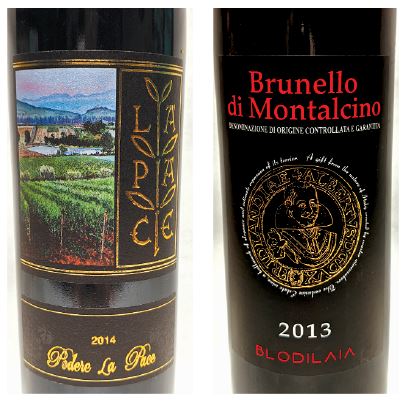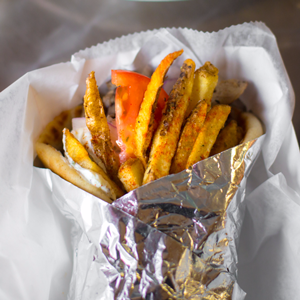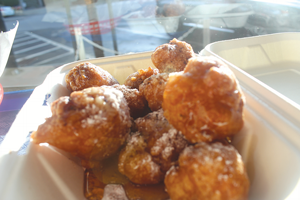Your guide to finding Greek festival favorites
Nearly all of this year’s Greek food festivals in the state have been canceled or postponed — but that doesn’t mean you can’t embark on a Greek food adventure of your own. Offering everything from savory dishes like pastichio and lamb shanks to sweet treats like baklava and loukoumades, several local Greek eateries talk about what they do best and what you can look forward to the next time you visit.
Pastichio
Known as a “Greek lasagna,” pastichio — sometimes also spelled pastitsio — is a baked pasta casserole dish with a creamy white béchamel sauce and meat, most commonly ground beef. Ioanis Kourtis, whose father and uncle together run Athens Restaurant in Manchester, said it’s available as a big, hearty serving on the eatery’s house specialties menu. It’s one of several dishes the two brothers prepare daily.
You’ll see different variations of pasta or meat. Peter Tsoupelis of Amphora Restaurant in Derry said he gets his macaroni imported directly from Greece to make the pastichio, which is often available out of the eatery’s refrigerated take-and-bake case. In Greece, because ground beef is not as readily available as in the United States, according to Tsoupelis, pastichio can instead be made with pork, lamb or even goat.
“The way we make it at Amphora, we use ground Angus beef, which is the way my father taught me how to make it,” he said, “but if there was going to be meat in my yiayia’s kitchen, it was going to be either pork or goat. We didn’t have ground beef or lamb often.”
At The Windmill Restaurant in Concord, pastichio is one of several rotating weekly specials prepared by Sofia Smirnioudis. She also has a hand in making the dish for the annual Taste of Greece festival at Holy Trinity Greek Orthodox Church in Concord, normally held in September.
“I like to use a big [pasta] … like a ziti,” she said. “I do pasta on the bottom, then a red meat-based sauce in the middle, and creamy cheese sauce on the top.”
Gyros
Pronounced “YEE-rohs,” gyros are popular street food dishes all over Greece, consisting of meat, vegetables and tzatziki sauce wrapped or stuffed in pita. At The Gyro Spot in downtown Manchester you can order all kinds of gyros, from pork, chicken or a mix of lamb and beef, to vegetarian or vegan versions with mixed greens.
“It’s kind of like the perfect hand-held meal. It’s got everything from your carbs to your proteins and veggies, wrapped up together,” Gyro Spot owner Alex Lambroulis said. “Most gyro shops in Greece will have a counter right outside the window in the summertime.”
The meats used for all gyros at the restaurant are hand-cut and marinated before being stacked as a döner kebab, or on a vertical rotisserie. The cone-shaped stack of meat is then layered with fat on the top and sliced into thin shavings when ready to be stuffed in a gyro.
Down in Nashua, Main Street Gyro offers more than a half dozen types of gyros daily, including the traditional pork but also chicken, lamb and bifteki, or a mix of pork and beef. Those are also stuffed with meat cooked on a vertical rotisserie.
“We make all our sauces in house as well, so we have tzatziki, and also kopanisti, which has roasted red bell peppers, feta cheese, olive oil, hot pepper flakes and Tabasco, so it’s a good spicy spread,” owner Basil Tourlitis said.
The traditional pork gyro is not only one of The Gyro Spot’s biggest sellers, but it’s the most common filling you’ll find in Greece, according to Lambroulis.
“We make our own tzatziki with Greek yogurt, garlic and cucumber, and then it comes with onions, tomatoes and our hand-cut fries,” he said. “Now, you might find different regional variations on the sauces, like tzatziki, ketchup and mustard, [but] everywhere you go [in Greece], they put fries in it.”
The eatery’s chicken gyro features a spicy mayonnaise known as its signature “G sauce.” Other less traditional options at The Gyro Spot include gyros reimagined as loaded french fries or burritos with rice.
Spanakopita
Also known as “spinach pie,” this popular pastry dish features layers of spinach and feta cheese stuffed inside phyllo dough, often also with scallions or onions, Tsoupelis said. Its phyllo pastry cousins include “tiropita” — with cheese and egg — and “kreatopita” — with meat, usually beef or pork. Variations on spanakopita might include the types of cheeses or vegetables used, or even the portion sizes. Main Street Gyro, Tourlitis said, makes its own spanakopita with spinach, feta cheese, dill, salt and pepper.
“Some people use leeks, [or] some use a majority of egg and feta,” Kourtis said. “My uncle makes it fresh with phyllo dough, spinach, feta, eggs and spices, and he butters the dough, so it’s very rich and delicious. … Spinach is the most universal.”
In some Greek households, according to Tsoupelis, it can be customary to bake an entire pan of spanakopita at a time, with large square-sized servings.
“My aunt lived in a small house outside of Athens, and she’d make a big pan of it,” he said. “It was almost like having a cake at the house for when somebody would come over. It might last 15 minutes or it might last a day and a half.”
But at Amphora, Tsoupelis said he likes to roll his spanakopita into individual 3-by-3-inch triangles and cook them to order, serving them more as intimate appetizers.
Spanakopita is also available homemade year-round at Chrysanthi’s Restaurant in Brookline, manager Amanda Pelletier said, as large pieces per serving.
Moussaka
Like the pastichio, moussaka commonly has ground meat and béchamel, only it’s baked in layers of eggplant, potatoes, or sometimes zucchini instead of pasta. Also known as an eggplant- or potato-based casserole, it’s another dish that Smirnioudis will often bake as a special at The Windmill Restaurant and for Holy Trinity Church’s Taste of Greece festival. In fact, she said she’ll use the same type of béchamel sauce used in the pastichio.
It’s also a frequent special at Chrysanthi’s, especially during the colder months, Pelletier said. Their version features layers of sliced potato and roasted eggplant with seasoned ground beef.
Amphora makes it with ground Angus beef, but Tsoupelis said he’s seen it with just about any other type of meat, especially lamb, pork or goat.
Souvlaki
Souvlaki features skewered meats and occasionally vegetables that can be consumed either as side dishes or as full meals over rice or with pita bread and tzatziki.
“[An order] comes with six pieces of lamb per skewer, and you get a Greek pita, tzatziki sauce, salad and hummus with that,” Pelletier said of the souvlaki offered at Chrysanthi’s.
Tourlitis said both pork and chicken souvlaki are options as dinners or sides at Main Street Gyro. A souvlaki dinner will include two skewers of meat, served with a side salad, hand-cut fries or rice pilaf and warm pita bread.
Souvlaki Pizza & Subs in Manchester, in addition to offering marinated pork souvlaki as a dinner with salad, rice or fries, prepares souvlaki as grinders on Syrian bread or as meats for salads. Pork and chicken souvlaki are also available at Salona Bar & Grill in Manchester, according to manager Maria Kostakis.
Even though pork is more traditional, Smirnioudis of The Windmill Restaurant said chicken tends to be the more popular meat for souvlaki. When it’s served as a special, the dish features chicken cut into cubes and cooked with garlic, oregano, salt and pepper.
Lamb shanks
Hand-cut marinated lamb is one of the biggest draws at many of the state’s Greek food festivals, whether it comes fresh off the skewer or in a gyro. At Amphora, you can get lamb shanks, or roasted leg of lamb, one of the eatery’s many Greek specialties. Each order comes with a side of lemon-oregano potatoes.
“We braise the lamb slowly until [the meat falls] off the bone, and then we … [make] a very rich sauce from all the drippings of the lamb that gives it a very nice flavor,” Tsoupelis said.
Lamb shanks are prepared similarly at Athens Restaurant in Manchester and are, according to Kourtis, a special item made at the request of customers. The meat is baked on the bone in a tomato sauce and spices, and served with a side like rice or vegetables.
At Chrysanthi’s, lamb shanks are on the menu during the fall and winter. They’re slow-roasted for 12 hours in a homemade sauce before they’re served over vegetables and rice, according to Pelletier.
Dolmathes
Featuring meat or vegetables with assorted spices, dolmathes are often sold as an a la carte item at Greek festivals, or sometimes as part of meals. They’re most commonly rolled and stuffed inside of individual grape leaves, but Tsoupelis said you might see regional variations of dolmathes that use larger cabbage leaves.
“We do them vegetarian style with the grape leaves, so they’re small. They’re the size of your hand,” he said. “We put them on our antipasto salad or on the side. It has seasoned white rice, lemon juice and mint.”
Salona Bar & Grill, according to Kostakis, offers the stuffed grape leaves with beef, while at Athens Restaurant, Kourtis said, the dolmathes can be made in both variations of leaves. You get three stuffed grape leaves and two stuffed cabbage leaves per order, from the appetizer menu, with either lemon or tomato sauce. The dolmathes are also incorporated on the eatery’s house specialties menu, coming with rice or potato or as part of a combo special with roast lamb, chicken or meatballs.
“It’s ground beef, spices, lemon and rice, and the lemon sauce is really thick. They’re very popular,” he said.
Baklava
Perhaps one of the most recognizable staples at Greek festivals and restaurants, baklava is a dessert featuring layers of phyllo dough, honey or syrup and chopped nuts, most commonly walnuts or almonds. Variations can include pistachios or hazelnuts, or a simple syrup made with sugar and water, or lemon juice, instead of honey.
Youla Winarta of Youlove Bakery, a homestead business based in Nashua, said even though the word “baklava” has roots in the Turkish language, the word “phyllo” comes from the Greek word meaning “leaf.” Indeed, baklava is often characterized by the leaf-like texture of the dough.
The phyllo dough can be either made or pre-bought at a supermarket or wholesale grocery store. Church members who make their own baklava for the festivals will use large cooking pans, because the baklava is easier to roll in larger quantities.
JajaBelle’s in Nashua doesn’t use honey in its homemade baklava, but rather a house syrup, a homemade phyllo dough and tons of butter. In addition to offering it in the case at the cafe, owner Jessica dePontbriand sells it at the Nashua Farmers Market at City Hall Plaza on Sundays.
The Puritan Backroom Restaurant in Manchester, according to manager Eric Zink, makes its own baklava, as well as a baklava ice cream, which features a vanilla base with cinnamon, honey, walnuts and baklava pieces.
In addition to offering a traditional baklava, Winarta makes a version with hazelnuts and a chocolate drizzle, or “chocolate rolls” with walnuts, almonds, chocolate and organic milk rolled in phyllo dough. All are available to order per eight pieces, for local pickups or shipping.
Loukoumades
Many Greek festivals in the state will have special stations for loukoumades made to order. More colloquially known as “Greek donuts” or “fried dough balls,” these bite-sized morsels are deep-fried before they are often drizzled with honey and sprinkled with cinnamon, sugar, or both.
You get eight loukoumades per order at The Gyro Spot, according to Lambroulis, which are made from an old family recipe. Regional variations of the dish might include a simple syrup in lieu of honey, or with chopped walnuts as a garnish.
“It’s a very loose dough, almost like a fluffy pancake batter,” he said, “and we just drop them into the fryer and then drizzle with honey, cinnamon and sugar or give it to you on the side. … I like to soak mine in honey.”
Greek cookies
Most Greek food festivals in New Hampshire have a wide selection of desserts, and while baklava is often the star, you’ve probably seen all kinds of cookies for sale too.
If you want to try Greek cookies you’d normally see at festivals this time of year, you can order them from Youla Winarta of the Nashua-based Youlove Bakery, who bakes them to order in a fully licensed commercial kitchen. She’s not currently at any farmers markets or public events, but offers her full product line for online ordering at youlovebakery.com/shop. One of the most traditional Greek cookies — and one of Winarta’s biggest sellers — is the melomakarona, or honey cookies with walnuts. Similar to melomakarona, she said, is finikia, with slight variations on the cooking method or toppings, from nuts to dates.
“I make them … with flour, olive oil, honey and then they have a lot of good flavors like orange zest and cinnamon cloves,” Winarta said. “It’s a cookie primarily prepared during Christmastime but one that everyone enjoys throughout the year now.”
She also makes kourabiedes and koulourakia. Kourabiedes are shortbread cookies also traditionally consumed around the holidays, covered with powdered sugar and baked with flour, butter, canola oil, eggs, baking powder, baking soda and natural flavors.
Koulourakia are butter cookies shaped in a twisted design and topped with sesame seeds.
“Those are traditionally prepared during Easter,” Winarta said. “They are very good with a cup of coffee or tea. … They are not really sweet and have a good crunchy taste to them.”
All of Winarta’s cookies are available for shipping or local pickups in the Nashua area.















